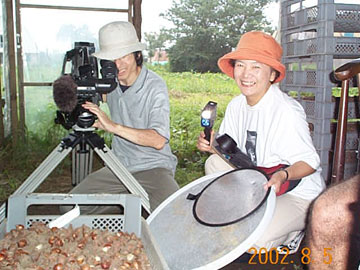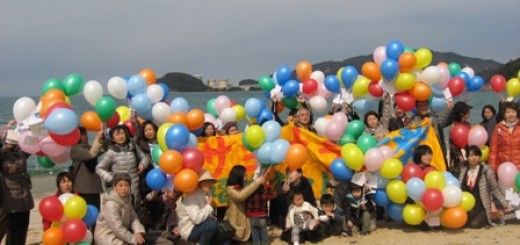Group Introduction KO-OK Productions: film-makers who say, “Radiation is not OK” Nuke Info Tokyo 116
By Shigeki Kobayashi and Yuko Oki
 |
Our company, KO-OK Productions, is a film production company run by the two of us: Shigeki Kobayashi and Yuko Oki. KO-OK is short for Kobayshi-Oki.We became involved with the anti-nuclear movement two years after Chernobyl when we were working with a group of friends to bring the 1987 German documentary “Spaltprozesse” to Japan. Produced by Denkmal-Film, “Spaltprozesse” means “nuclear fission process,” and the documentary depicts the protest of residents against the Wackersdorf nuclear reprocessing plant. During a two-year period, the documentary was screened at over two hundred places throughout Japan. Since then, whenever we can squeeze time in between our regular work, we make documentaries and film footage focusing on nuclear issues, such as the problem of nuclear waste. We have made a number of short films which have been shown to the public. Not only have we shot in Rokkasho Village, Aomori Prefecture, where plans for Japan’s nuclear fuel reprocessing plant continue unabated, we have also shot in Tokyo, the center of government and the place where national nuclear policy is ultimately determined.
Since 1997, we have attended public hearings in Tokyo held by the (former) Science and Technology Agency, the Ministry of Economy, Trade and Industry (METI), and the Japan Atomic Energy Commission. Whenever possible, we have filmed the proceedings. We were able to film the meetings in which discussions leading up to the “Framework for Nuclear Energy Policy” (Japan Atomic Energy Commission) took place. Our main purpose was to observe and witness what was discussed and how it was discussed, and to make this information public. During our filming, it was clear to us that the Commission members, including the academic specialists, displayed no sensitivity to the critical problem of radiation.
With each passing minute, more and more radiation is being emitted into our natural environment, where it continues to accumulate. Sources of this radiation are multiple: from Rokkashomura, from the waste produced at nuclear power plants across the country, and even from medical institutions such as hospitals and laboratories. The question is, what are we going to do about this? Who will take responsibility for the long-term problems which are being created? These questions are for both the supporters of nuclear power, who have caused these conditions, and for members of the general public, who must live with the consequences. To question the issues of nuclear power and radiation is to consider the hidden oppressive nature of our society and to question the manner in which our present civilization has developed. We believe such questions call for a re-thinking of education, for it is education which connects this generation to the next.
Our everyday work consists of making public relations videos for companies and films concerning children’s issues for schools. In 2003 we produced a documentary film set in a nursery school entitled “Eat, Grow, Raise, Cultivate.” We are currently working on a sequel which will further explore issues of food and agriculture. The theme will be “an environment where children can grow, and people can live.” Cut off from the earth, people cannot survive, life cannot be sustained. Needless to the say, the theme of our film is connected to the problems posed by radiation.
“Living creatures do not know [how to handle] radiation. In the billion-year long history of life on our planet, living creatures have not developed the ability to identify and expel radiation from their bodies.” It is from this perspective that we are committed to continue making films that examine the threat of nuclear power and radiation.

